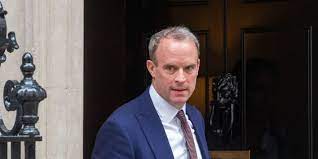
Dominic Raab has felt compelled to hand in his resignation from his role as deputy PM after a report was sent to Rishi Sunak, following a five month inquiry into complaints from civil servants about Mr Raab’s behaviour in several ministerial roles, which amounted to accusations of bullying.
The investigation was led by senior lawyer Adam Tolley KC, after Mr Raab, who has been a close ally of the PM, had strenuously denied all of the allegations levelled against him, insisting that he “behaved professionally throughout” and was simply a strict and demanding boss.
In a long resignation letter to Mr Sunak, the former deputy PM, who was also the justice secretary, said that the adverse findings against him set a “dangerous precedent”. The PM replied, accepting the action, but stating he was doing so “with great sadness”.
Opposition leader Sir Keir Starmer took the opportunity to aim another swipe at Mr Sunak when responding to Dominic Raab’s resignation, declaring that it showed the “continual weakness” of the PM, who he said should never have appointed Mr Raab in the first place, and instead of waiting for his resignation, he should have sacked his deputy PM.
Replacing Mr Raab in his two roles are Alex Chalk, who steps up to be the new justice secretary, and Oliver Dowden who has been appointed as the next deputy prime minister.
Eight complaints prompt call for inquiry
The report was called for in direct response to eight formal complaints from civil servants, who worked under Mr Raab in three previous ministerial roles: justice secretary and foreign secretary under Boris Johnson, and Brexit secretary under Theresa May.
There were mixed messages from colleagues during the investigation period with one unnamed MP calling the situation a “ticking time-bomb” and adding that Mr Raab was “totally unsuitable for high office.” However a former senior civil servant described him as being “professional, incredibly hard working, but very demanding.”
Another parliamentary colleague was keen to stress that Mr Raab was not a bully, but admitted that on a handful of occasions he had seen him reduce a staff member to tears because of the standard of their work, which could be construed as “bullying behaviour”. They went on to say that “at a flick of a switch he could turn incredibly angry and pretty offensive in the way in which he talked to people.”
It is understood that the identities of some of those who have given evidence during the enquiry have been protected in the published report, although Mr Raab himself has been made aware of the names of those who have given evidence, which could lead to some frosty conversations in the coming days and weeks.
Report highlights aggressive manner
The 48 page report from Mr Tolley mentioned a total of 66 interviews being carried out over the investigation period, with 44 written contributions submitted. In one of the complaints, upheld from his time at the Foreign Office, Mr Tolley concluded that Mr Raab had “acted in a way which was intimidating, in the sense of unreasonably and persistently aggressive in the context of a workplace meeting.”
He added that the former deputy PM had conducted himself in a way that involved an abuse, or misuse of power, “in a way that undermines or humiliates,” and concluded that Mr Raab ought reasonably to have been aware of this effect.
Intimidating behaviour
Also, the threat of unspecified disciplinary action was also a form of intimidating behaviour, as were his use of physical gestures. On another occasion he was said to have gone further than was necessary or appropriate in delivering critical feedback and also insulting, in the sense of making unconstructive critical comments about the quality of work done.
His use of phrases such as: “utterly useless” and “woeful” were heavily criticised and Mr Tolley made reference to the fact that Mr Raab had been able to regulate his level of “abrasiveness” since the announcement of the investigation and therefore should have altered his approach much earlier.
There was no evidence, the report said, of misuse of power as Brexit secretary, with Mr Tolley finding that there was nothing to suggest any offensive, malicious, or insulting behaviour.
Keeping his word
Mr Raab wrote tendering his resignation to Mr Sunak immediately after the release of the report. He stated that as he had called for the inquiry and undertook to quit if there was any findings of bullying, he felt it was important to keep his word.
Dangerous precedent set
He said it had been a privilege to serve as Deputy PM, but could not resist questioning parts of the report, going as far as to say it was flawed and “set a dangerous precedent for the conduct of good government by setting the threshold for bullying so low.”
He felt that by doing so it would inevitably encourage spurious complaints against Ministers, and have a chilling effect on those driving change on behalf of the government, and ultimately the British people.
He remarked that Ministers must be able to give direct critical feedback on briefings and submissions to senior officials, in order to set the standards and drive the reform that the public expect. Although he did concede: “Of course, this must be done within reasonable bounds.”
Continued support
He was quick to highlight that Mr Tolley had concluded that he had not once, in four and a half years, sworn or shouted at anyone, let alone thrown anything or otherwise physically intimidated anyone, nor indeed intentionally sought to belittle anyone. He went on to say: “I am genuinely sorry for any unintended stress or offence that any officials felt, as a result of the pace, standards and challenge that I brought to the Ministry of Justice.”
He ended his letter to Mr Sunak by calling him a “great prime minister in very challenging times,” and reiterating his continued support, albeit from the backbenches.
Seemingly not a “ladies” man
Dominic Raab was first elected to Parliament in 2010 and became a junior minister following David Cameron’s election victory in 2015. He played a prominent role in the successful “Leave” campaign in the 2016 EU referendum, but was sacked by Theresa May when she took over as PM.
When Boris Johnson took over Mr Raab was promoted to foreign secretary and first secretary of state. As foreign secretary he was criticised heavily for his handling of the aftermath of the fall of Afghanistan, especially for remaining on holiday in Crete while the Taliban marched back to power.
He threw his backing behind Mr Sunak during the leadership race that followed Mr Johnson’s departure. It was hardly surprising that he was not included in the cabinet of Liz Truss, but he soon returned to government once Mr Sunak was appointed.
Resignation reluctantly accepted
Rishi Sunak reluctantly accepted his resignation in his return letter, reminding Mr Raab that upon his appointment to the top position he pledged that his government would have integrity, professionalism and accountability at every level, meaning that the ministerial code requires ministers to uphold the highest of standards.
He did concede that it was clear that there had been shortcomings in the process which has negatively affected everyone involved. He praised Mr Raab’s record of delivery in both his government and the previous administrations. He gave specific mention to how he has put the rights of victims at the heart of the criminal justice system, as well as increasing sentences for violent criminals, reforming the probation system, and pushing forward the biggest prison-building programme in over a century.
Grateful for support
He also thanked him for stepping in during the Covid crisis, when Mr Johnson was hospitalised with reassurance and leadership at a moment of profound national concern. “As chancellor at the time, I was struck by the collegiate way in which you handled this most difficult of challenges,” was his description of how he handled the moment.
“I will always be grateful for your steadfast personal support during last year’s Conservative Party leadership contest from the day you introduced me at the launch to the last day of the contest.” Additionally, he thanked Mr Raab for his subsequent dedication, commitment and loyalty in discharging his responsibilities as deputy prime minister, which he said: “has been typical of your belief in public service.”
Replacements quickly in place
Little time was wasted before Mr Raab’s replacements were introduced, with Alex Chalk taking over as Secretary of State for Justice and Oliver Dowden stepping in as Deputy PM.
There actually is no directive for appointing a deputy and the role is not an official capacity; indeed there have been long periods where governments have not had one, but Mr Sunak seemingly prefers someone he can trust alongside him, so he will be hoping to hang on to this one a little longer than the last.













0 Comments